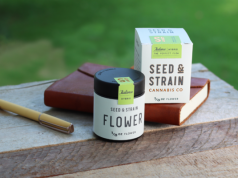Summary
In California, recreational marijuana is poised to boom in 2018, many cultivators that are setting up larger scale cultivations.
Unlike agricultural crops, scientists have rather limited knowledge of how much an average person may ingest or inhale or use a cannabis product on a daily basis.
Nature-Cide developers worked side by side with pest control operators and cannabis cultivators to develop a program that ensures organic production for marijuana cultivation
As legalization continues to allow for opportunities to fix problems like the pesticide issue in marijuana cultivation, Med-X, Inc. management continues to recognize that this will not happen overnight. This is evident as the state of Colorado is now in its 3rd year of legal recreational marijuana usage, and cultivators are still having compliance issues.
In California, recreational marijuana is poised to boom in 2018, many cultivators that are setting up larger scale cultivations in what seemed to be a perfect scenario, are finding they are going to be stopped dead in their tracks. Many that have taken a position in California’s central valley, known to most in the state, as the “heartland of agriculture”, now realize that no matter what precautions they take to be compliant, that the neighboring farms, and the farmers that owned the land prior to them, are causing imminent failure with constant pesticide contamination. These legal cultivators now have to deal with things like contaminated soil, ground water and pesticide aerial crop dusting.
“We won’t be able to grow cannabis next to traditional, full-scale agriculture. It just won’t be practical,” said Hezekiah Allen, the Executive Director of the California Growers Association. “I live in Yolo County. I see the crop dusters. It’s not going to work.” For example, to fight powdery mildew and insect infestations many traditional farmers will use pesticides known as myclobutanil, Eagle 20 and Avid. These pesticides are considered somewhat safe for washable crops for edible consumption and crops like cotton, but when these pesticides are burned – as it would be if they are on cannabis flowers – research shows that in many cases they turn into poisonous gases, which can be quite harmful if inhaled. Not only are there a lot of pesticides by volume, but also by type.
“Unlike agricultural crops, when it comes to cannabis goods, scientists have rather limited knowledge of how much an average person may ingest or inhale or use a cannabis product on a daily basis,” Charlotte Fadipe, assistant director of California’s Department of Pesticide Regulation, told GreenState. It’s easy to see how this could potentially lead to huge problems for both cultivators and marijuana consumers.
Although it will likely take a while, the permanent solution to the problem is cultivators developing better habits and using approved pesticides, while working together with agriculture authorities and licensed pest control operators, to get all of these issues under control. Licensed Pest Control operators are beginning to adapt to the needs of the marijuana cultivator’s in various states, and being called upon to bring a controlled skill set, using various marijuana cultivation approved pesticides and methods.
One product in particular that is gaining attention in commercial Pest Control and in marijuana cultivation, is Nature-Cide, which Colorado, Washington and Oregon agriculture departments, have placed on each state’s approved list for marijuana production. Nature-Cide Insecticide is a product line that has eight years of research and development behind it. It’s a product that has been used in Green Pest control programs around the country for commercial and residential applications, and has adopted cleaning protocols and methods for marijuana cultivation, to be performed by licensed pest control professionals in unity with cultivators. Most state agriculture offices require registration of any and all pesticides, regardless of the type of pesticide or their toxicity level, which is one of the reasons why Nature-Cide has been discovered by cultivators and pest control professionals alike.
“In late 2015 Nature-Cide developers worked side by side with pest control operators and cannabis cultivators to develop a program that ensures organic production for marijuana cultivation, from cuttings, to harvest, we completed the protocol method and released a study in March of 2017, that is now being adopted by pest control professionals in multiple states.”, states Matthew Mills, COO of Med-X, Inc.
Med-X, is the exclusive distributor of the Nature-Cide line of products for the marijuana industry, and is a research, development and education company, and its personal is considered industry leaders at the forefront of “Minimum Risk Pesticide” usage, in all aspects of pest control. In March 2017 Med-X, Inc released The Nature-Cide 18-Month Integrated Pest Management for Cannabis Cultivation Report.
Med-X’s Nature-Cide division has begun a decent on the marijuana industry with education from the Nature-Cide’s 18-Month IPM report, that gives Pest Control operators the ability to successfully integrate marijuana cultivation facility pest control protocols, into an everyday routine. Med-X’s Nature-Cide division will position Pest Control companies in multiple states beginning in Colorado with Madero Pest Control in Pueblo CO.
Madero Pest Control services a variety of commercial and residential clients throughout the city of Pueblo. In mid-2015, Madero Pest Control began to see a demand coming from cannabis cultivators and medical marijuana dispensaries in the immediate area. While discussing the needs with the cultivator and dispensary owner/operator, it was realized that in both of these scenarios, it was imperative for operators to be compliant with county and state agriculture inspectors.
“Many do not realize, as a pest control professional and company, in order to be 100% compliant, one must follow multiple strict guidelines as well as keeping detailed records of any and all pesticide applications – and be ready to fully divulge any and all applications – within the county at any given moment, if inspectors ask. On one occasion, we have had to go to a cultivation site that we service regularly, and go over all the details and records with the agricultural inspector. This gave the cultivator owner/operator a much higher level of confidence when going through the inspection; needless to say, we passed the inspection”, states Nick Madero of Madero Pest Control.
Nature-Cide IPM protocol seem to join the marijuana cultivation community and pest control professionals in a seemingly imminent marriage, and solid reasoning why in most other agricultural settings, licensed pest control applicators are deployed to keep farmers 100% compliant with pest control applications.






